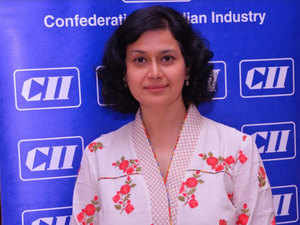 CII Odisha State Office will provide all support to the government in making Make in Odisha a grand success, says Jagi Mangat Panda who is also the MD of Ortel Communications.
CII Odisha State Office will provide all support to the government in making Make in Odisha a grand success, says Jagi Mangat Panda who is also the MD of Ortel Communications.
Jagi Mangat Panda, MD of Ortel Communications, achieved a milestone when she was appointed chairperson for the eastern region of Confederation of Indian Industry (CII) last month becoming the first woman for the job. For two decades, Panda has built from scratch a broadband and broadcasting company that today is an undisputed leader in the Odisha TV space. Ortel has also ventured into neighbouring Chhattisgarh, Andhra Pradesh and West Bengal.
Jagi is wife of MP Baijayant Panda, who was recently suspended from the primary membership of Biju Janata Dal (BJD). She has always maintained that their news channel OTV’s greatest strength has been its unbiased reporting. In an emailed interview with ET’s Meera Mohanty on her various roles, she stands by this even when OTV has been dragged into political feud between her husband and BJD.
Congratulations on your new appointment. What do you think should be the priority areas for CII in the east?
Historically, the eastern region has been the manufacturing and industrial hub and was globally acclaimed for its growth and development and contribution towards global GDP. We need to continue with our effort to rebuild east so it can once again play a significant role in India’s growth story. Keeping this in mind, this year we will continue with our existing theme for CII Eastern Region which is Rebuild East: Invest in Development. Under this theme, our priority areas would be agriculture, food processing, ease of doing business, education and skill development, infrastructure, sustainability, manufacturing and MSME, healthcare and tourism.
A chunk of non-performing assets have their plants in Odisha or elsewhere in the east like Bhushan, Essar. What is CII’s role in this backdrop?
CII’s role is to work with the industry and the government to create an environment conducive to the growth of the industry. This year we will emphasise on bridging the trust deficit that the industry faces from the government and the citizen.
What are some immediate issues the CII wants addressed by the state governments in Odisha, West Bengal and Jharkhand?
Higher growth and more investment in key sectors will be our focus across the eastern region in Bihar, Chhattisgarh, Jharkhand, Odisha and West Bengal.
CII has decided not to partner in the Make in Odisha conclave? Some attribute this to the differences OTV and your organisation may have with the ruling government.
I am surprised to hear that. CII state offices always work closely with the state governments in all their endeavours. CII Odisha State Office will also provide all support to the government in making MIO a grand success. Also OTV is not involved in this as I am the chairperson of CII Eastern Region and do not represent Odisha only.
Would you say the Odisha police’s decision to question OTV journalists was a serious abuse of power?
Since you are a journalist, you will be better placed to answer this question. Here’s my question to you. How would you react if the police called you and questioned you for hours on just one question i.e. about your source?
Your channel has always maintained it is apolitical or unbiased. How does it ensure this and is it possible for a media house associated with a political family to be unbiased?
If one is determined, yes, it is possible to stay unbiased. Just like it is possible to be biased even when not connected to a political family. OTV and all the people working in it are bound by its charter and strictly follow the charter. OTV is known for its credibility for which we have been rewarded by our viewers, who have kept us at the No 1 position for 20 years.
Would you defend the channel’s decision to telecast a half-hour interview with the lady who threw an egg at the CM?
That is an editorial decision and I do not interfere with it.
As someone who has had a long stint in the media industry, what are your views on “fake news” and possible solutions to the problem?
Under the present circumstances in the country, there may be a need to look at the international standards on freedom of expression and the experiences of other developed countries which may provide guidance and shed light on the issue of fake news. Also the difference in treatment between fake news propagated by ordinary citizen and fake news peddled by the governments should be recognised first.
[“Source-economictimes”]




